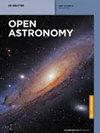A novel autonomous navigation constellation in the Earth–Moon system
IF 0.5
4区 物理与天体物理
Q4 ASTRONOMY & ASTROPHYSICS
引用次数: 0
Abstract
With more and more activities in cislunar space and deep space, a navigation system that can provide autonomous navigation service for cislunar or even deep space missions has become an urgent need. This article proposes a new type of navigation constellation which is placed on two kinds of special orbits, namely the dynamical substitutes around the triangular libration points and the distant retrograde orbits (DROs). Both types of orbits have the same characteristics of long-term stability under the full force model, so no orbit control is needed and it can operate autonomously without ground support. First, using inter-satellite range data, the autonomous orbit determination between navigation satellites on the dynamical substitutes and the DROs is investigated under the full force model. Then, taking a translunar orbit as an example, the constellation’s navigation performance based on inter-satellite range observation is evaluated. With range errors of 1, 10, and 100 m, respectively, the navigation capability of the constellation is successfully verified in the sense that the accuracy of the determined orbit reaches the level of the observation data. From the viewpoint of stable autonomous navigation, the current results are meaningful and deserve further consideration when deploying the navigation constellation in the Earth–Moon system.地月系统中的新型自主导航星座
随着在半月空间和深空的活动越来越多,迫切需要一种能够为半月甚至深空任务提供自主导航服务的导航系统。本文提出了一种新型导航星座,它被置于两种特殊轨道上,即三角形天平点周围的动力替代轨道和遥远逆行轨道(DRO)。这两种轨道在全力模型下具有相同的长期稳定性,因此无需轨道控制,可以在没有地面支持的情况下自主运行。首先,利用卫星间距数据,研究了在全力模型下,导航卫星在动力替代物和 DROs 上的自主轨道确定。然后,以平移轨道为例,评估了基于卫星间测距观测的星座导航性能。在测距误差分别为 1 米、10 米和 100 米的情况下,成功验证了星座的导航能力,即确定的轨道精度达到了观测数据的水平。从稳定自主导航的角度来看,目前的结果是有意义的,值得在地月系统中部署导航星座时进一步考虑。
本文章由计算机程序翻译,如有差异,请以英文原文为准。
求助全文
约1分钟内获得全文
求助全文
来源期刊

Open Astronomy
Physics and Astronomy-Astronomy and Astrophysics
CiteScore
1.30
自引率
14.30%
发文量
37
审稿时长
16 weeks
期刊介绍:
The journal disseminates research in both observational and theoretical astronomy, astrophysics, solar physics, cosmology, galactic and extragalactic astronomy, high energy particles physics, planetary science, space science and astronomy-related astrobiology, presenting as well the surveys dedicated to astronomical history and education.
 求助内容:
求助内容: 应助结果提醒方式:
应助结果提醒方式:


